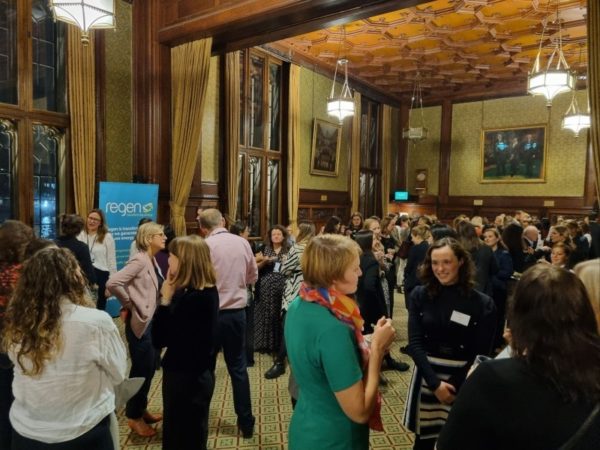On International Women’s Day, Regen’s Associate Director Rachel Hayes discusses the challenges of increasing gender diversity in the energy sector.

The energy sector is widely regarded as one of the least diverse parts of the UK economy. A quick look at the statistics lays this bare. Only 27% of board seats and 15% of executive director seats are filled by women[1], and women make up a mere 24% of the overall STEM workforce[2]. More than a third of the UK’s top energy companies have no women on their board at all[3].
Clearly, this level of female representation is not enough. We need more women in our sector, whether it’s in hard hats and hi-vis jackets installing solar panels or at the head of the table for high-level climate negotiations.
This is especially important right now. Our energy system faces several big, pressing challenges – from fundamentally transforming policies, markets and regulation to meet net zero, getting to grips with an enduring energy crisis, and tackling devastatingly high levels of fuel poverty across the country. Rising to these challenges will require drawing on all talents of society and bringing every voice into the room.
Tackling barriers to gender diversity is also crucial to ensure the benefits of the net zero transition are felt equally. The UK Government promises that growth in low carbon industry could create 90,000 new jobs across the UK within this Parliament, and up to 250,000 by 2030[4] – from electric vehicle manufacturing in the Midlands and the North East to our thriving offshore wind industry centred on the Humber and the Tees. The opportunities in exciting new sectors such as floating offshore wind and green hydrogen are vast and include engineers, fitters, construction workers, data scientists, asset optimisers, entrepreneurs and much more. However, if the energy industries singled out as areas for job creation are male dominated, there is a risk that women are left out.
Our sector must therefore make it our common mission to come together and deliver much faster progress on reducing barriers to female representation in clean energy. That’s what the Women’s Energy Network Alliance (WENA) launched this year has set out to achieve.
Drawing from an experienced group of women’s networks including our own Regen’s Women in Renewable Energy Network, as well as Women in Nuclear, POWERful Women, Lean In Equity & Sustainability, ALLY and District Heating Divas, the Alliance knows all too well the challenges that women in our sector can face to enter senior positions and feel their contributions are valued. Together, we aim to address these key systemic barriers that are hampering women’s progress into boardrooms, slowing down the just transition, and preventing the growth of a vibrant and diverse green sector.
The challenges
My experience in running ReWiRE and engaging with and supporting women in clean energy on gender diversity over the past decade suggests there are several key shared challenges facing women across all facets of the sector.
1. You can’t be what you can’t see. Often as women we seek out positive role models and mentors to look up to when striving towards senior positions; it can be disheartening and isolating trying to do so alone! Building personal networks and connecting with women in senior roles to see where you can get to is essential for progress from middle management to senior management and senior management to board level. If you can’t see a woman ahead of you, then you are inclined to think career progression is not possible in that company and move to one where the path is well trodden.
2. Square pegs don’t fit round holes. When addressing gender diversity, the focus is often on changing single policies or providing one-off training, but these are only useful if they come with fundamental change to cultures and working environments. Women think differently. These differences need to be embraced through changing how organisations behave, leadership norms and being accommodating to flexible working practices.
3. No woman is an island. Coming together with your tribe is an essential part of career growth, lesson sharing and confidence building. Women tend to struggle more when it comes to going for roles where they feel they might not meet the whole criteria, or having the confidence to get up on a stage. Making meaningful connections with other women in the sector can help unlock the confidence to pursue opportunities – leaning on our Women’s Energy Network Alliance (WENA) networks to push each other on and hold one another accountable.
We are at a pivotal moment for the energy sector. As we weather the current storm and chart a course towards a more inclusive, fair and sustainable energy system, diversity must be an invaluable asset that we embrace in earnest. That means making it a top priority for every company, every board and every senior leader. If there was ever a time to shift the dial on gender diversity, it’s now as we go about transforming our energy system for the better.
For the first time, the Alliance will host a half-day conference, on Tuesday 14th March 2023 in person at the BEIS Conference Centre in London. The theme is ‘Striving to thrive in a transitioning sector’ and is timed to continue the gender diversity conversation after today’s International Women’s Day (8th March).
Please find the programme (tickets are £50.00 + VAT) here.
[1] POWERful Women (2022) https://powerfulwomen.org.uk/wp-content/uploads/2022/05/amendedcomparison-chart-2019-2022-final-amended.jpg
[2] STEM Women (2019) https://www.stemwomen.com/women-in-stem-percentages-of-women-in-stem-statistics
[3] PwC (2020) https://www.pwc.co.uk/press-room/press-releases/number-of-women-at-the-top-of-the-uk-energy-sector-rises-.html
[4] UK Government (2020) https://www.gov.uk/government/publications/the-ten-point-plan-for-a-green-industrial-revolution
See this blog featured in BusinessGreen’s article here and on Linkedin here.
